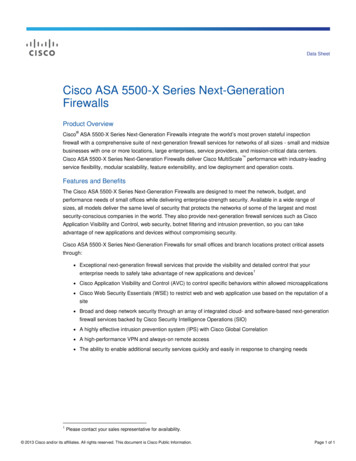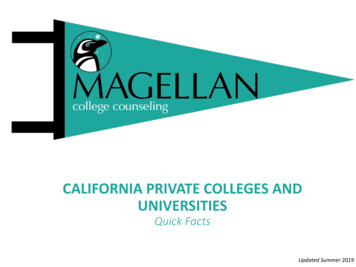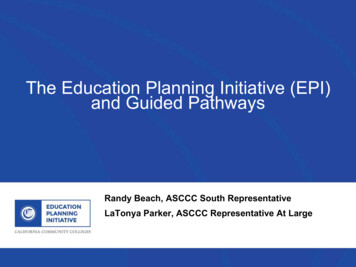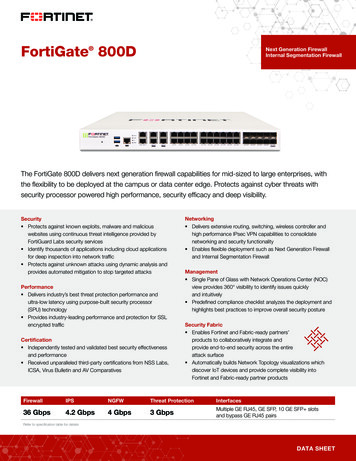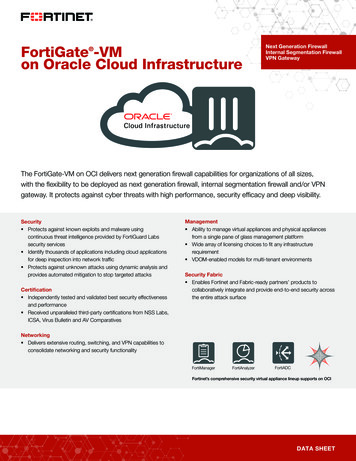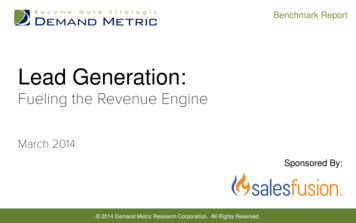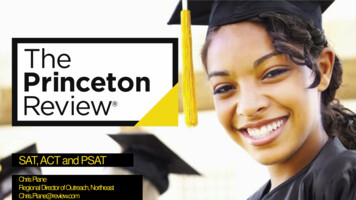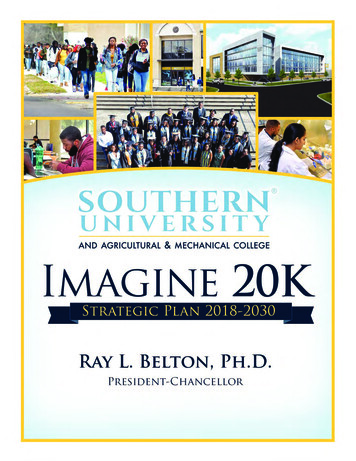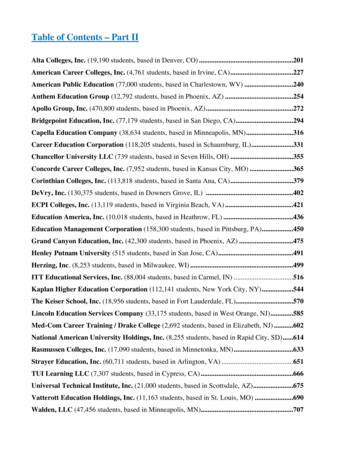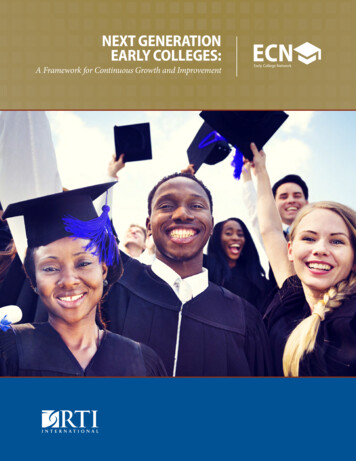
Transcription
NEXT GENERATIONEARLY COLLEGES:A Framework for Continuous Growth and ImprovementECNEarly College Network
NEXT GENERATION EARLY COLLEGES:A Framework for Continuous Growth and ImprovementECNEarly College NetworkThe Early College Network is a peer learning community of practice focused on improving outcomes for current and futurestudents. Since its inception in 2017, the network has worked to define a shared identity and establish a roadmap that exemplifieswhat early colleges need to become in the future to continue to meet the changing needs of our students and community.Developed by principals in the network, the Next Generation Early College Framework includes five guiding Design Principlesthat describe the qualities of a Next Generation Early College:I. Demonstrates a commitment to creating an environment that supports the social and emotional learning ofall students through a personalized approach;II. Exhibits teaching for learning through innovative instructional practice that builds student self-efficacy throughactive collaboration;III. Leverages the connections among school, home, the community and workplace to expand authentic learningopportunities and partnerships;IV: Ensures that students are prepared for post-secondary education and careers in a rapidly changing global economy;andV: Embodies a growth mindset for professionals that pushes boundaries through shared responsibility, reflectivepractice and inquiry.Each of the five Design Principles has three Attributes that describe the unique characteristics of early colleges that separatethem from traditional high schools. Going one step further, each Attribute contains two to three Elements that further expressdistinctive components and exemplars.Organized as an implementation continuum, the framework contains four levels of implementation from “Early” to “Model.”Although descriptors are referenced for the “Early,” “Developing,” and “Prepared” stages, each early college will develop thedescriptor for their “Model” stage based on local context and goals as they use the tool in a self-assessment process. Thecontinuum models a personalized growth mindset that supports school improvement. Therefore, as conditions and goals evolve,the definition of “Model” remains responsive.This shared resource was developed as a self-assessment tool, rather than an evaluation instrument. The Next Generation EarlyCollege Framework supports a school’s development, encourages the identification of strengths and areas of focus in the future,and provides a common language for continuous growth and improvement. We hope this tool will be useful to your school andencourage its use to support your school’s development and its next iteration as you strive to best support your students to andthrough early college.Sincerely,Angela H. Quick, EdDDirector, Center for Education ServicesRTI InternationalEARLY COLLEGE NETWORK 1
Thank you to the community of Early College Network principals and staff for their leadershipin developing the Next Generation Early College Framework.The 2018-2019 Early College Network includes the following schools:Bertie Early College High SchoolBrunswick Early College High SchoolCabarrus Kannapolis Early CollegeCabarrus Tech Early CollegeCamden Early College High SchoolChatham School of Science and EngineeringCraven Early College High SchoolCross Creek Early CollegeCumberland International Early College High SchoolCumberland Polytechnic High SchoolDavidson Early CollegeDavie Early College High SchoolEarly College EAST High SchoolFranklin County Early College High SchoolGaston Early College High SchoolGranville Early CollegeHenderson County Early College High SchoolIsaac Bear Early College High SchoolJ. P. Knapp Early College High SchoolJ.D. Clement Early College High SchoolMattamuskeet Early College High SchoolMcDowell Early CollegeMiddle College High School at Durham Technical Community CollegeMontgomery County Early CollegeNew Tech High SchoolNortheast Regional School of Biotechnology and AgriscienceOnslow Early College High SchoolPerson Early College for Innovation and LeadershipRoanoke Rapids Early College High SchoolRockingham Early College High SchoolRowan County Early CollegeRutherford Early College HighScotland Early College High SchoolSoutheast Area Technical High SchoolSurry Early College High SchoolUnion County Early CollegeVance County Early College High SchoolWake Early College of Health and SciencesWashington County Early College High SchoolWayne Early Middle College High SchoolWilmington Early College High SchoolWilson Academy of Applied TechnologyYadkin Valley Regional Career Academy2 EARLY COLLEGE NETWORK
TABLE OF CONTENTSIA Next Generation Early College demonstrates a commitment to creating an environmentthat supports the social and emotional learning of all students through a personalized approach.(1) Social Emotional Learning: Social and emotional health fostered across the school community.4(2) Personalization as the “heart beat” of the school.5(3) Formal advisory structure at all levels.6IIA Next Generation Early College demonstrates teaching for learning through innovative instructionalpractice that builds student self-efficacy through active collaboration.(4) Intentional planning to scaffold student collaboration, voice and choice.7(5) Individualized student support.8(6) Reflective practice to encourage staff collaboration and professionalism to make practice public.9IIIA Next Generation Early College leverages the connections among school, home, the community andworkplace to expand authentic learning opportunities and partnerships.(7) Effective school-community partnerships with the IHE and area businesses for all students.10(8) Community service focus to promote and sustain authentic learning opportunities for all students.11(9) Experiential learning opportunities to give students practical experiences in their field of study.12IVA Next Generation Early College ensures that students are prepared for post-secondary education andcareers in a rapidly changing global economy.(10) Ongoing communication and collaborative professional development between high school and IHE faculty.13(11) Alignment of high school and IHE scheduling and curricula to career pathways.14(12) Purposeful planning to develop future-focused student skills (soft skills, metacognitive skills, etc).15VA Next Generation Early College embodies a growth mindset for professionals that pushes boundariesthrough shared responsibility, reflective practice and inquiry.(13) School culture embodies collegial atmosphere of networking.16(14) Shared leadership that is responsive to data.17(15) Common instructional practices across all learning environments.18References.19EARLY COLLEGE NETWORK 3
NEXT GENERATION EARLY COLLEGES:A Framework for Continuous Growth and ImprovementIA Next Generation Early College demonstrates a commitment to creating an environmentthat supports the social and emotional learning of all students through a personalized approach.1.3PROFESSIONAL COLLABORATION1.2PARENT/GUARDIAN RESOURCES1.1SEL ACTIVITIESKEYELEMENT(1) Social Emotional Learning: Social and emotional health fostered across the school communityEARLYDEVELOPINGPREPAREDSome students areengaged in SEL-focusedactivities throughoutthe school year.All students havethe opportunity toengage in SEL-focusedactivities throughoutthe year.All students engagein purposeful SELfocused activities thatare evident in theirdaily actions andschool culture.Parents/Guardians haveaccess to resources andactivities that supportSEL.Parents/Guardians aresupported by schoolstaff in understandingand engaging in SELactivities at home.Parents/Guardianspartner with schoolstaff to providepurposeful SELsupport for students.Professionaldevelopmentopportunities areprovided to stafffocused on SEL.SEL professionaldevelopment forstaff is supportedthrough collaborationopportunities in followup sessions.A staff developed SELEngagement Plan isimplemented andevident in staff andstudent behaviorsthroughout the school.MODEL **Model descriptor should reflect local context and priorities with an emphasis on systemic and sustainable practices.4 EARLY COLLEGE NETWORK
NEXT GENERATION EARLY COLLEGES:A Framework for Continuous Growth and ImprovementIA Next Generation Early College demonstrates a commitment to creating an environmentthat supports the social and emotional learning of all students through a personalized approach.2.3 EXTRA- ANDCO-CURRICULAR ACTIVITIES2.2STUDENT-STAFF COLLABORATION2.1FAMILY ATMOSPHEREKEYELEMENT(2) Personalization as the “heart beat” of the schoolEARLYDEVELOPINGPREPAREDStudents are engagedin grade level activitiesthat foster connectionsand build community.Staff and studentsparticipate in informaland formal activitiesto support existingand develop newconnections both inand out of the school.Students assumeresponsibilityfor creatingand supportingrelationships acrossgrade levels andstudent interests andbeyond the schoolwalls.Students and staffoccasionally collaborateon activities both inthe classroom andthroughout the school.Staff plans activitieswith student input on aregular basis.Staff and studentsdemonstratea continuousimprovement cyclewith inputs andreviews to improveelements of the school.Students have accessto activities outside theclassroom.A regular calendar ofactivities is designedand implemented forstudents.Students generateand lead extra- andco-curricular activitiesthat reflect the diverseinterests of studentsand demonstrateownership of processesand outcomes.MODELEARLY COLLEGE NETWORK 5
NEXT GENERATION EARLY COLLEGES:A Framework for Continuous Growth and ImprovementIA Next Generation Early College demonstrates a commitment to creating an environmentthat supports the social and emotional learning of all students through a personalized approach.3.3COLLEGE AND CAREER PREP3.2PEER MENTORING3.1SEL THEMESKEYELEMENT(3) Formal advisory structure at all levelsEARLYDEVELOPINGPREPAREDStudents have accessto a formal advisoryprogram that providesage-appropriate themesto support SEL.Through a formaladvisory program,students haveopportunities toengage in personalizedactivities designed tosupport SEL.Students and staffengage in seminarsbased on grade levelrelevance with a focuson comprehensivestudent development.Opportunities exist forpeers to mentor eachother.Staff provides informaland formal structuresand supports fordeveloping peermentors.A formal system ofpeer mentoring andmediation exists for allstudents throughoutclasses and schoolactivities.Advisory programssupport both collegeand career preparation.College-going skills aredeveloped in studentsas a preparation forcareer advancement.Student and staffactions consistentlydemonstrate theimportance ofcollege, career and lifeconnections.6 EARLY COLLEGE NETWORKMODEL
NEXT GENERATION EARLY COLLEGES:A Framework for Continuous Growth and ImprovementIIA Next Generation Early College demonstrates teaching for learning through innovativeinstructional practice that builds student self-efficacy through active collaboration4.3INSTRUCTIONAL PRACTICE CYCLE4.2 ALIGNEDINSTRUCTIONAL STRATEGIES4.1DATA DRIVENKEYELEMENT(4) Intentional planning to scaffold student collaboration, voice and choiceEARLYDEVELOPINGPREPAREDStaff has access toteacher and school datato design instructionand guide school improvement planning.Staff uses data in apurposeful manner toguide instruction andschool improvementplanning.Staff uses data in anongoing basis, utilizecommon assessmentsand collaboratein data-supporteddiscourse for classroomand school-levelimprovements.Staff has reachedconsensus on alignedinstructional strategiesand daily expectationsfor demonstration.Staff occasionallyemploys alignedinstructional strategiesacross the school.Students and staff areengaged in the use ofaligned instructionalstrategies every day.Staff individuallypractices some elementsof the instructionalpractice cycle: model,teach, practice andassess.Staff has reachedconsensus andregularly practiceall elements of theinstructional cycle.Staff observes andprovide feedbackthrough lessontuning and peerreviews to support theinstructional practicecycle.MODELEARLY COLLEGE NETWORK 7
NEXT GENERATION EARLY COLLEGES:A Framework for Continuous Growth and ImprovementIIA Next Generation Early College demonstrates teaching for learning through innovativeinstructional practice that builds student self-efficacy through active collaboration.5.3INDIVIDUAL STUDENT FOCUS5.24-5 YEAR PLANNING5.1SEMINAR EXPERIENCEKEYELEMENT(5) Individualized student supportEARLYDEVELOPINGPREPAREDStudents participatein grade appropriateface-to-face seminarsthat are designed foracademic needs.Consistent individualacademic supportsare offered throughseminar experiences.Students’ collective andindividual academicneeds are supportedthrough seminarexperiences.Students and staffdevelop a four/five yearplan.Staff, students andparents regularlycollaborate to assessprogress and revise thefour/five year plan.Students assumeownership of theplanning and executionof the four/five yearplan.Staff demonstrates afocus on individualstudent growth inacademics, affectivesupports and SEL.Structures are in placeto support staff in theirsupport of individualstudents (ie. Officehours, Smart Lunch)A system of supportsfor students andstaff are evidentand demonstratedthroughout the schoolsetting.8 EARLY COLLEGE NETWORKMODEL
NEXT GENERATION EARLY COLLEGES:A Framework for Continuous Growth and ImprovementIIA Next Generation Early College demonstrates teaching for learning through innovativeinstructional practice that builds student self-efficacy through active collaboration.6.3FOCUS ON RESULTS6.2USE OF PROTOCOLS6.1ROUNDS AND PEER SCHOOL REVIEWSKEYELEMENT(6) Reflective practice to encourage staff collaboration and professionalism to make practice publicEARLYDEVELOPINGPREPAREDStaff engages inreflective activitiesincluding instructionalrounds in the schoolto improve individualpractices.Staff engages inreflective activities suchas peer school reviewswith other schools toimprove schoolwidepractices.A collaborativenetwork of peers acrossschools consistentlyengage in a cycleof development,practice and reviewfor continuousimprovement.Protocols areoccasionally used bystaff.A resource bank ofprotocols is availableand regularly used bystaff in classrooms.The use of protocolsby staff and studentsdemonstrates anintention of student/staff collaboration andstudent voice/choice.Staff collects anduses data to makeinformative decisionsabout instructionin a continuousimprovement cycle.Data is collected,distributed andanalyzed for individualstudents, staff andschool community.Students and staffidentify, collect,monitor and analyzedata on an ongoingbasis through PLCs,individual studentsupports, andschoolwide discourse.MODELEARLY COLLEGE NETWORK 9
NEXT GENERATION EARLY COLLEGES:A Framework for Continuous Growth and ImprovementIIIA Next Generation Early College leverages the connections among school, home, thecommunity and workplace to expand authentic learning opportunities and partnerships.7.3COMMUNITY WORKPLACE NEEDS7.2STUDENT INTERNSHIPS7.1 PRODUCTIVEPLANNING AND ENGAGEMENTKEYELEMENT(7) Effective school-community partnerships with the IHE and area businesses for all studentsEARLYDEVELOPINGPREPAREDStaff develops aplan that involvesstakeholders from theIHE, business/industryand community groups.Staff and stakeholdersengage in productiveplanning and reviewdata to determineeffectiveness indesigning opportunitiesfor students in thecommunity.All students participatein authentic learningopportunities throughpartnerships with IHE,business/industry, andcommunity groups.Staff develops aplan to increasestudent internshipopportunities.All stakeholdersengage in planningstudent internshipopportunities andsome studentsparticipate.All stakeholders engagein ongoing work toidentify and developstudent internshipopportunities alignedto student interestand community needsand most studentsparticipate.Staff and stakeholdersidentify communityworkplace needs.Community workforceneeds are supportedby student and teachercommunity learningopportunities.Staff and studentsparticipate inopportunities toadvance student andteacher learning inSTEM and othercommunity-basedfields that build apipeline to communityemployers.10 EARLY COLLEGE NETWORKMODEL
NEXT GENERATION EARLY COLLEGES:A Framework for Continuous Growth and ImprovementIIIA Next Generation Early College leverages the connections among school, home, thecommunity and workplace to expand authentic learning opportunities and partnerships.8.3RECRUITMENT8.2SCHOOL ADVOCACY8.1COMMUNITY NEEDS ASSESSMENTKEYELEMENT(8) Community service focus to promote and sustain authentic learning opportunities for all studentsEARLYDEVELOPINGPREPAREDStaff collaborates withcommunity leaders toidentify student serviceopportunities.Staff and students plancommunity-basedvolunteer opportunitieson an annual basis.Staff and studentsengage in communityservice opportunitieson a quarterly basisand demonstrateconnections to school.Students and staff serveas advocates for theearly college in theircommunity throughoutreach efforts.Students andstaff engage withcommunity leaders andgroups to advocate forthe early college.Strategies to engageand serve as advocatesfor the early college aredeveloped, monitoredand implementedthroughout the schoolyear.Staff examinesopportunities to expandlearning opportunitieswith IHE and areabusiness/industry.Staff engagesall stakeholdersestablishingrelationships with IHEand area business/industry.Ongoing efforts aremaintained to buildexisting relationshipsand secure new oneswith IHE and areabusiness/industry.MODELEARLY COLLEGE NETWORK 11
NEXT GENERATION EARLY COLLEGES:A Framework for Continuous Growth and ImprovementIIIA Next Generation Early College leverages the connections among school, home, thecommunity and workplace to expand authentic le
The Early College Network is a peer learning community of practice focused on improving outcomes for current and future students. Since its inception in 2017, the network has worked to define a shared identity and establish a roadmap that exemplifies . Gaston Early College High School Granville Early College

